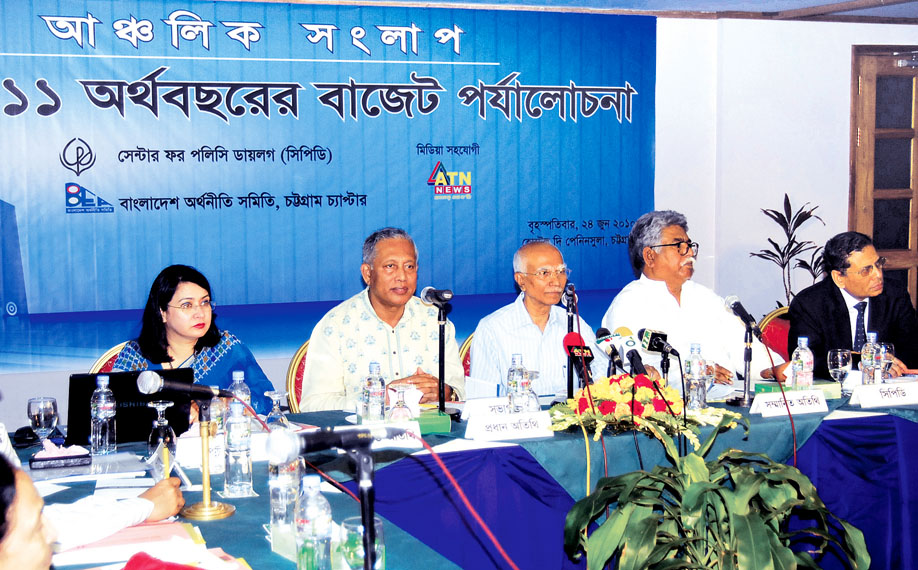Good performance with regard to budgetary implementation and a depoliticised bureaucracy in the development process were called for by the discussants in a post-budget dialogue titled An Analysis of the National Budget for FY2010-11, held on 24 June 2010 at the Dalia Room of Hotel The Peninsula, Chittagong organised by the CPD in association with Bangladesh Economic Association (BEA) (Chittagong Chapter).
Hon’ble Minister for Industries, Mr Dilip Barua was the Chief Guest, whilst Mr Mainuddin Khan Badal, MP was the Special Guest. Professor Muinul Islam of Chittagong University and Mr Saifuzzaman Chowdhury, Former President of Chittagong Chamber of Commerce and Industries (CCCI), provided valuable insights as Designated Discussants. The session was chaired by Professor M Sekandar Khan, President, BEA (Chittagong Chapter), and the welcome speech was delivered by Professor Mustafizur Rahman, Executive Director, CPD. CPD’s Additional Director, Research, Dr Fahmida Khatun presented the keynote paper.
Dr Khatun remarked that the budget for FY2010-11 is a crucial watershed since this will be the last year of the PRSP as well as the first year of the Sixth Five Year Plan and the Perspective Plan. She flagged some of the highlights of the proposed budget including broadening the tax net and the opportunity to invest in bonds to be issued under the BIFF by paying a tax rate of 10 per cent. Dr Khatun stressed the need for straightening regulatory reforms, public expenditure reform and revamping the role of BBBF in order to raise efficacy of public service delivery.
Professor Muinul Islam termed the budget as ‘feasible to achieve’ though some of the critics had termed it as an ambitious one. He highlighted that the power crunch affected the economy adversely during the last fiscal and had slowed down the GDP growth. Taking into cognisance the domestic savings and remittance ratio to GDP was much higher against a stagnant investment-GDP ratio in recent years, he underscored the need for adequate and appropriate use of the surplus savings which was about 5-6 per cent of the GDP. Opposing the opportunity given to legalise the undisclosed money to be invested under the BIFF, he remarked “it was not a workable effort.” Professor Islam strongly argued for subsidy in livestock sector, particularly in fish breeding, poultry sectors, etc. He also opposed the proposed reduction of tariff to 5 per cent on milk powder and urged the government to provide subsidy to domestic livestock producers.
Mr Saifuzzaman Chowdhury emphasised the importance of power sector and insisted on immediate exploration of coal and gas from the offshore fields. He also felt that there was a need for appropriate directions for nuclear power plant installation in the budget. He proposed to build specialised ‘SME parks’ in different parts of the country.
In his Special Guest’s speech, Mr Mainuddin Khan Badal, MP urged for steady and quality implementation of ADP projects. He expressed his disappointment as no special allocation for Chittagong was earmarked in the budget. He asked for activation of autonomous bodies of the government and decentralisation of governing bodies. He suggested to build a ‘coastal belt Chittagong highway,’ without disturbing agricultural lands. He criticised the slow pace of policy implementation by the bureaucracy and urged for depoliticisation of that bureaucrates. He also called for an active role of lawmakers.
Mr Dilip Barua in his speech as the Chief Guest informed that agriculture, safety net and food security has received the highest priority in the budget. He assured that subsidy to agriculture would be raised as required, and allocation for research & development in agriculture would be strengthened. Government’s active interest to heighten the pace of investment, infrastructure development, and establishment of deep sea port got reflected in his speech.
Professor Sekandar Khan, in his concluding remarks, urged for more independent working environment for the existing autonomous commissions of the government. He felt that 30 per cent of the national budget should be allocated to the local government.
The dialogue was addressed by politicians, businessmen, academics, researchers, lawyers, and representatives of NGOs, and eminent citizens of Chittagong.


